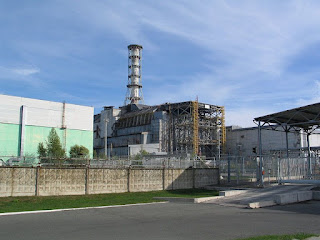Twenty-six years
after the world’s worst nuclear disaster, work has begun on a huge new metal
shelter to cover the Chernobyl reactor.
The structure, which is so big you could put the Statue of Liberty
inside, should be finished by 2015.
After the
disaster on April 26, 1986, a concrete ‘sarcophagus’ was hastily erected, but for
years it has been crumbling, allowing radiation to leak out. Once the new structure has been finished,
the delicate and dangerous task of dismantling the reactor and clearing up vast
amounts of radioactive waste around it can begin.
The Ukraine
government has received more than £600m in donations from other countries to
enable the work to proceed. One donor,
the European Bank for Reconstruction and Development, said there was no room ‘for delay, for
errors or for poor performance.’
All those things were evident
in the original disaster, the contamination from which, according to some
estimates, has cost up to 200,000 lives and damaged the health of a further 2m
people. (See also my blogs of April 14,
2009 and March 14, 2011.)



